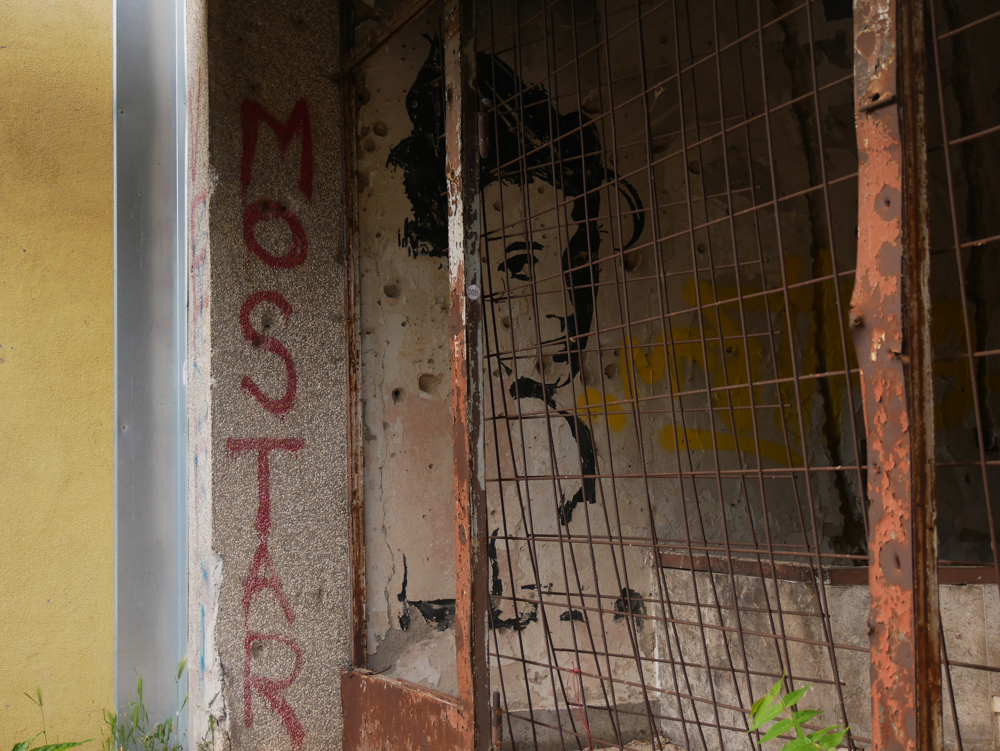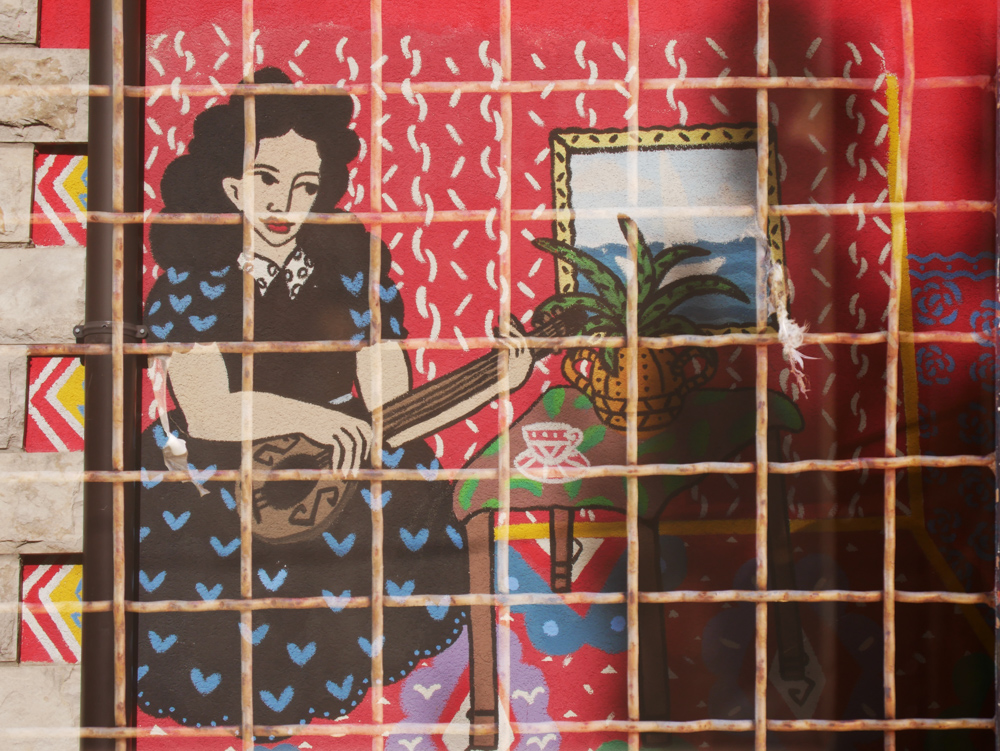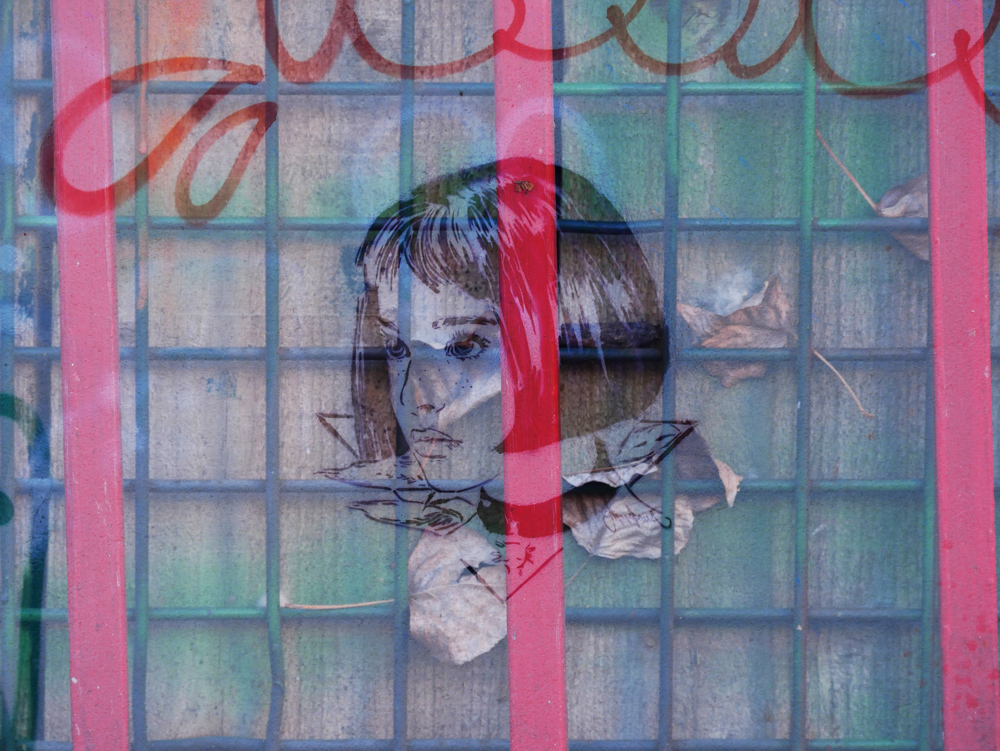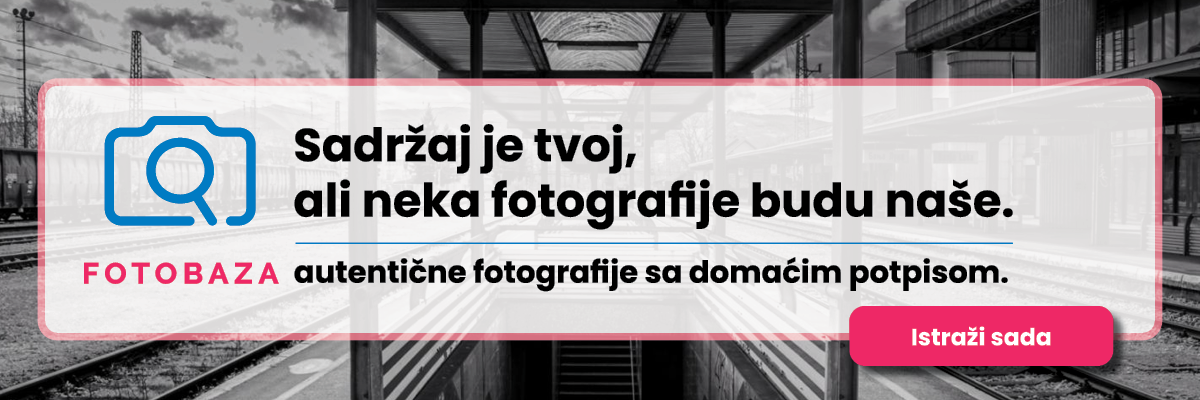In Bosnia and Herzegovina, women who have escaped femicide also face other forms of violence, including economic violence. In Mostar, the Žena BiH shelter helps them rebuild their lives.
Pišu: Cloé Calame, Izabela Dominiković i Katarina Petrović; Fotografije: Cloé Calame
The terrace burns under the light, but Tea Rebac raised her glasses. She is categorical: we will not have access to the place we are looking for, the shelter of the women’s protection association, Žena BiH. It is the only shelter that matches criteria defined by local NGOs around Mostar, a touristic city in southern Bosnia and Herzegovina located in the Herzegovina-Neretva county. “Only the police and the team of social workers know the address. To access it, you must sign a contract.” It’s complicated. It’s dangerous too. The reason the location of the Žena BiH shelter is kept secret, is that the women it hosts are still at psychological and physical risk. They were marked by torture, humiliation, or death threats.
They have sometimes narrowly escaped femicide, and they fear being found by their attackers. In many cases, these women are persecuted by their partners, former husbands, or other family members. Tea Rebac was also threatened with death. She has worked at the shelter as a psychotherapist and social worker for over seven years. She does much more than that despite a modest wage: driving the shelter’s refugees, looking for jobs they could apply for, finding housing… After fleeing domestic and family violence, these women arrive at the shelter in great precariousness, without realizing that they have also been victims of economic violence.
As long as he doesn’t beat her
“If he's not beating you, you don't see that it's also kind of violence”, says Antonija Petričušić, a sociologist at the University of Zagreb in Croatia.
Because it is directly visible on the body, physical violence is the most obvious. It stresses the difficulty of recognizing the economic aspect of gender-based violence, “a kind of violence that is committed over a person because of her inferior social status and her position in the society of being a female, from the perspective of the perpetrators”. The economic aspect is materialized in different financial control schemes, usually implemented by the husband or another family member. A brother, a father. In 2023, the European Institute for Gender Equality identified three forms of economic violence. The first one is economic control, when for example the victim gives her salary to his partner who redistributes pocket money. Then there is economic exploitation, such as when the partner opens a credit on behalf of the victim without his consent and finally, economic sabotage, if the partner persuades the victim to stop his studies or work.
For those affected, economic violence has long-term consequences.

“That kind of gender- based violence results in deprivation of financial independence and autonomy of women in general”, explains the sociologist Antonjia Petričušić. “By putting women away from the job market and not allowing them or controlling them in the access to the job market, in the long term, causes consequences. Because those women who need to stay home to take care of the family and undertake those traditional roles, which are being asked by their partners, do not have pensions in the long term. They very often don't have health insurance”.
In Bosnia and Herzegovina, the employment rate of women in the labor force in 2020 was 29.9%, compared to 50.9% for men, according to the Statistical Agency of the Government of Bosnia and Herzegovina. In 2022, the gap widens: 28.9% of women were employed, compared to 52.1% of men. Regarding the unemployment rate in 2022, it was 19.8% for women against 12.6% for men. In the Herzegovina-Neretva county, the situation improved over the period 2022-2023, where the employment rate for women was 40.8%.
“One hundred percent of women arriving at the shelter have economic difficulties”, says Tea Rebac, but sociologist Antonjia Petričušić insists: “Gender-based economic violence does not reflect a social class or rural-urban area or whatever level of education”.
Yet this form of violence seems invisible in Bosnia and Herzegovina. First, on bank accounts. Alen Demirović, a banker from Mostar, maintains that to his knowledge, “in his 21-year career, he has never seen a single woman open an account under the tutelage of another”.
Nevertheless, he adds that it is not possible for a bank to know precisely who is using the account and if someone else is managing it. There is therefore no rule of prevention or transparency regarding the risk of financial control. The subject is taboo, but the main reason for the shadowing of economic violence is that it is not perceived as violence. They are “internalized as the protocol for managing the family budget”, explains Antonija Petričušić.
Financial management tasks are sometimes simply delegated to men, women considering themselves unable to perform them. They sacrifice their economic power and independence. The lack of financial education of victims and perpetrators helps to maintain the roots of these violent practices in society. For example, says the sociologist, “people in general, in this part of the world, are not equipped with knowledge of what taking a loan actually implies, that when you sign your name with the bank, you're supposed to return all the amount of money. So sometimes they're fooled, but not only with the banks, sometimes they owe to illegal”.

The traditionally unequal aspect of patriarchal societies is also in question: “It's a common tradition and perception, here in the Balkans, that women need to sacrifice for the well-being of the family. If you're a female, you're a good daughter, you're a good wife, you're a good sister, if you do something for your brother, father, mother”. Aldijana Trbonja-Tule has seen this culture of sacrifice throughout her career as a social worker. Committed to the Association of Citizens of Mostar, she met women who had to give their money to their husband, repay their debts or “give the money they earned very hard by caring for seniors, caring for children, cleaning other people’s homes and businesses.” This combination of isolation, control of money, control of purchases is combined with all other forms of violence, psychological and physical. Aldijana Trbonja-Tule insists that “we cannot isolate the economic aspect of other forms of rights-of-way only”.
Heal from punches before getting financial freedom
“What is love? baby don’t hurt me”… We’d wish to cut off this music that the speakers vomit in the middle of our conversation. We are still on the terrace of a cafe in Mostar, with Tea Rebac. Before working on the subject, the team must allow them to readjust to a secure environment.
“With this woman, the problem was the vacuum cleaner. She could not clean with a vacuum cleaner because the hose terrified her. She was afraid her husband would come back when she did. In the end, we came to understand that he regularly strangled her with cables*.”
*Inspired by real facts, this story was transformed to anonymize the victim or victims for protection purposes. All protagonists, dates and locations have been changed.
The residents themselves must contribute to the daily functioning of the shelter. “It’s like occupational therapy”, says the psychotherapist, a work rehabilitation. “They clean, wash, prepare breakfast for the children. There is also a games’ room for them”. Victims are integrated into their new environment and give meaning to their presence through these tasks. Then there is the physical and psychological care, which varies according to the specific history of the person and the extent of the violence she has suffered.

“Some women arrive as undead. They see no sense. It is a very difficult, long, and demanding process. What I have noticed in general is that they lack self-confidence, because their attackers are excellent manipulators”, says Tea Rebac. Women usually feel guilty and sometimes think they deserve their lot.
“I think of a woman who was preparing meat. The slices were badly cut. Her brother beat her very violently, simply because the slices were badly cut. When you constantly hear that you are not good, then you think that you are guilty and incapable*.”
*Inspired by real facts, this story was transformed to anonymize the victim or victims for protection purposes. All protagonists, dates and locations have been changed.
Economic violence is not necessarily the most traumatic for the victims, but they must nevertheless face their consequences to get out of the circle of violence.
“To have money”, explains sociologist Antonjia Petričušić, “it is one of the first things to start over in a new apartment, in new circumstances”. The residents of a shelter like Žena BiH, funded largely by international NGOs, benefit above all from the valuable investment of workers, as there is no direct or specific support for victims from the government, entities that structure the country or the counties. “We are lacking institutional capacity to create the social welfare system”, sums up Joško Mandić, advisor for the governmental Agency for Gender Equality. The country’s institutions suffer from a lack of resources: “material, financial or even human.”
But the most important, according to him, is a lack of disciplinary tools or sanctions.
“We don't have a strong institution which would be effective in terms of ensuring that implementation of the law, full application of the law, timely, effectively, and for the benefit of citizens.”
Tea Rebac believes that shelters are responsible for the fate of victims of domestic violence.
“Once again, we cannot rely on institutions or external assistance. One way or another, we solve the problem ourselves as women’s gathering in Bosnia and Herzegovina”.
Leaving the shelter: a critical step of the process
Each story is different, recalls the psychotherapist, but in general, the residents of the Žena BiH shelter “are poorly educated, 99% unemployed, often accompanied by their young children.” For Tea Rebac and the other shelter workers, exit strategies are an important issue: if victims do not find housing, employment, or a solution to keep their children, they have no choice but to return to live with their abuser. This phenomenon of return is common.
It is even more so when the victims are disgraced in the eyes of their families, which do not come to their aid. The return to work is then essential. Tea Rebac says that for her to make it through, she had to personally accompany a resident through every step of the process.
“The shelter paid her rent for the first two months. At the same time, we found her a job and managed to have the child looked after for free, not far from the apartment, so that she did not have to drive.”
The Žena BiH association has been able to obtain free registration in daycare for two years now through the municipal council. Sometimes, women get out of it thanks to the help of their families, despite their difficult past and the hard work of their former spouses.
“This is another example of a positive exit strategy”, Tea begins.

“This woman was 36. She came with three children. Before she escaped her home, her husband took her by car outside Čapljina to torture her in various ways, until she confessed her infidelity. He made her run naked under the rain. Of course, in this kind of situation, victims admit what their abuser want them to admit, whether they have done something or not. She was admitted to the shelter and one day we received a letter from the police and a call from the social action center accusing her of raping her children. Her husband was behind these accusations, which led to a real legal battle. After months and months, we finally succeeded, as she was mentally collapsing. It took a long time, but we were successful. She got custody of her children, we started divorce proceedings and her family helped us build her a house. She received donations from us: a machine, a stove, goods, food… But our work has been most important from a legal perspective. Over time, we have continued to follow it. She found a job. The children went to school. She was fortunate to have the help of her family.”
*Inspired by real facts, this story was transformed to anonymize the victim or victims for protectionpurposes. All protagonists, dates and locations have been changed.
Economic violence persists
For these women, arriving at the shelter doesn’t mean the end of the troubles. When they are subjected to gender-based violence, residents may be subject to revictimization phenomena that aggravate their precariousness: they are subjected to new violence or discrimination. The phenomenon begins before their arrival at the shelter: if the husband is violent towards his family, it is the women and children who must leave the house. An illogical operation, since it punishes the victims and not the aggressors. Within the association Žena BiH, “this is something that has been talked about for years in seminars, trainings, to ensure that it is no longer always the victim who must leave”, explains Tea Rebac.
Women who are victims of domestic violence are also discriminated against at work. Regarding hiring in Bosnia and Herzegovina, says Joško Mandić “employment bureaus are having programs where they are giving additional points for the employers who would employ women victims of violence or different training which would be free of charge for the women victims of violence”.
Nevertheless, according to a December 2022 government survey, 68.1% of employers in the Herzegovina-Neretva county said it would not be in favor of hiring women victims of violence. Tea Rebac says that victims can also be dismissed in different cases. For example, if their abuser comes to harass them at their workplace, some employers prefer to prevent the violence of former companions from disturbing the work environment.
“Several years ago, Žena BiH welcomed a financially independent woman. She had a bank account and was employed, even though it was a fixed-term contract. Unfortunately, she was pregnant and her contract terminated because of her pregnancy. She found herself without a job, but she certainly did not have to go back to her husband, who was very violent. For this woman, the problem was not her lack of education or financial incompetence, but circumstances. This situation was even more complicated because in Mostar, says Tea Rebac, “it is difficult to get a job, including for educated women”.
The shelter must create a whole ecosystem to enable victims to get out of the circle. Today, it cooperates with local actors and institutions.
“We have a great relationship with lawyers”, says Tea Rebac, which allows Žena BiH to provide free legal aid to residents. This is also the case with schools and with certain doctors or health centers”, continues the psychotherapist. Žena BiH has also initiated cooperation with a pharmacy so that shelter residents can have free medicines and hygiene products. “Discretion is always respected;they know the delicacy of the situation.”
Politics Facing Intimacy
Freedom of speech is difficult in Bosnia and Herzegovina. No direct testimony could be heard for this article. Nevertheless, a first wave of testimonies has taken place in several Balkan countries in recent years, notably with the Facebook group and the website Nisam tražila.
However, these testimonies remain focused on physical and sexual violence. Again, economic violence remains hidden, embedded as a norm, with a few exceptions: for the diskriminacija.ba media, journalist Masha Durkalić collected in 2018 the testimony of a woman from Sarajevo, married in the 1970s, who was under full financial control from her husband 1.
From a political point of view, much remains to be done in Bosnia and Herzegovina. For Joško Mandić, awareness-raising is an ongoing process.
“There is more and more talks about it, which is really needed, more public discussion. I'm not a fan of so-called raising awareness and then similar activities, but there are more and more people aware that economic inequality, gender inequality causes also violence against women and domestic violence”.
He points to the issue of inheritance: “Traditionally, in our region, including Bosnia and Herzegovina and by all nations, males are mainly inheriting the assets, the properties, which leads to a situation where males have in their hands much, much more resources than
women”.
According to him, “In the short run, what state, politics and decision-makers can do is to empower women directly, to make it possible for them to have their own resources and have the freedom to use those freely”. Guarantee the possibility of choice at the legal level, although this choice can then be influenced within the family sphere. It is “the maximum that the state can do interfering in the family relations”, hence the importance of long-term transformations through education, which would allow women to become autonomous, according to Joško Mandić. But the boundary between family and political matters questions.
For Antonija Petričušić, “violence has been for too far long a private matter”. According to her, “it was tolerated by the society, who believed that it's not society's business and responsibility to interfere. Luckily, that issue is becoming a matter of scientific interest”. A smile appears on her face, before insisting: “violence can’t be a private matter”, even when it’s rooted in intimacy.







